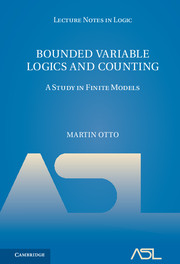Preface
Published online by Cambridge University Press: 24 March 2017
Summary
Viewed as a branch of model theory, finite model theory is concerned with finite structures and their properties under logical, combinatorial, algorithmic and complexity theoretic aspects. The connection of classical concerns of logic and model theory with issues in complexity theory has contributed very much and complexity theoretic aspects. The connection of classical concerns of logic and model theory with issues in complexity theory has contributed very much to the development of finite model theory into a field with its own specific flavour.
I like to think of this monograph as a study which — with a particular theme of its own — exemplifies and reflects some central ideas and lines of research in finite model theory. The particular theme is that of bounded variable infinitary logics, with and without counting quantifiers, related fixed-point logics, and corresponding fragments of PTIME. The relations with PTIME exhibit that fruitful exchange between ideas from logic and from complexity theory that is characteristic of finite model theory and, more specifically, of the research programme of descriptive complexity.
Among the main particular topics and techniques I would emphasize:
— the importance of games as a fundamental tool from classical logic; their use in the analysis of finite structures also with respect to algorithmic and complexity theoretic concerns is amply illustrated.
- the role of cardinality phenomena, which clearly are amongst the most fundamental guidelines in the analysis of finite structures.
- the importance of combinatorial techniques, and of dealing with concrete combinatorial problems over finite domains. Examples here range from applications of the stable colouring technique in the formation of structural invariants to certain colourings of squares that come up in canonization for logics with two variables.
In order that this study may be useful also as an introduction to some of the important concepts in the field, I have tried to treat the particular theme in a detailed and mostly self-contained manner. On the other hand this treatment leads up to specific results of a more technical nature, and I welcome the opportunity to present some contributions in a broader context.
- Type
- Chapter
- Information
- Bounded Variable Logics and CountingA Study in Finite Models, pp. v - viPublisher: Cambridge University PressPrint publication year: 2017



